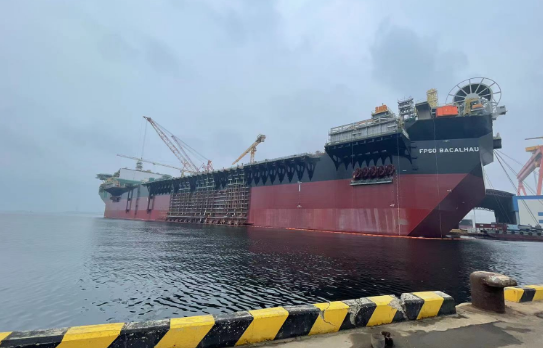Global orders for new ships increased by nearly 300%, and the shipbuilding market cycle has turned around.
At the investor exchange meeting held recently, China Heavy Industry also highlighted the cost risk. The company said that since the beginning of this year, affected by the sharp rise in the price of raw materials such as steel, the price of Marine steel plate continues to run at a high level, and the production cost of shipbuilding enterprises remains high. The 20mm ship plate has increased by 44% year-on-year, which has brought huge cost pressure to shipbuilders and squeezed profit margins.
In the face of rising steel prices, China Heavy Industry mainly focuses on procurement to reduce costs, in-depth cost engineering and other ways to resolve, including through the centralized procurement platform of bulk materials to strategic cooperation procurement, and strive to reduce procurement costs, through construction cycle management, target cost management, product optimization and upgrading, as far as possible to reduce production costs.
Chi also addressed the issue of the exchange rate, with the yuan appreciating 6.92 percent in 2020 and 1.20 percent as of Sept. 10. Most of the company's shipbuilding contracts are settled in US dollars, and the construction period is long. In the context of the increasing uncertainty of RMB exchange rate fluctuations, it is more difficult to control exchange rate risks.
New environmental protection regulations accelerate changes in shipping and shipbuilding markets
A common challenge for the shipping and shipbuilding markets is the implementation of new IMO environmental regulations. When Evergreen Shipping ordered 24 new vessels to Whampoa, the industry judged that because these new vessels meet the future international carbon emission reduction requirements and international environmental standards, Evergreen Shipping's move is also aimed at laying out for the future low-carbon ship era and increasing the capacity to replace the old.
At present, the industry's measures to deal with the new IMO environmental protection regulations are mainly divided into three kinds, one is the host power limit, that is, the installation of some equipment to limit the host power; The second is to slow down the navigation, reduce the fuel consumption of the ship, in order to meet the carbon emission standards; Third, disassemble and scrap. Either way, it will limit the shipping industry's capacity supply.

According to the judgment of the Han Army, the current 15 years old ship accounted for 20%, IMO environmental protection regulations will be implemented on January 1, 2023, for the ship age of 18 years and above, basically can not meet the requirements of the new environmental protection regulations, that is, the ship age of more than 15 years now. As a result, shipowner companies have an incentive to update this section of vessels.
Shipbuilders have also launched a response to the new regulations, the person in charge of China Heavy Industry said that the green transformation of the shipbuilding industry gives birth to new opportunities, the demand for new fuel-powered ships such as ammonia, hydrogen and LNG is growing, a new round of technological change such as low-carbon ships and zero-carbon ships has brought industrial opportunities, and the in-depth development of information technology has laid a solid foundation for the development of smart ships.
The person in charge said that China Heavy Industry is highly concerned about the impact of carbon peak and carbon neutrality on the ship-sea market, and actively promotes the research and development and application of new fuel-powered ships such as green ships and zero-carbon ships, and relevant subsidiaries have also carried out the layout, research and application innovation of new fuel equipment such as hydrogen/ammonia. In the future, the company will continue to increase the research and layout of low-carbon emission vessels.
China Shipbuilding revealed that the company's major shareholders have acquired the internationally renowned diesel engine company WinGD in the early years, and the company's affiliated enterprise Hudong Heavy has developed multi-type dual-fuel diesel engines, effectively reducing carbon emissions. At the same time, the company's shipbuilding enterprises have also launched a variety of independent research and development of low-carbon ship types, the amount of undertake continued to improve.
It is worth mentioning that the competition among domestic shipping companies is also very fierce, for example, most of the orders held by COSCO Sea Control are received by associated shipyards. At present, the domestic shipyards mainly include CSSC, the shipyards of COSCO Shipping Group and the private shipyards represented by Yangzijiang.
Regarding the structure of the shipbuilding market, Zhang Chao believes that the orders of China's leading shipyards are basically concentrated in container ships, and the competitive relationship is mainly reflected in the price of new ships and the comprehensive management ability of scheduling, etc. Yangzijiang Shipyard has a strong performance in the comprehensive management ability of scheduling.
- ABB
- General Electric
- EMERSON
- Honeywell
- HIMA
- ALSTOM
- Rolls-Royce
- MOTOROLA
- Rockwell
- Siemens
- Woodward
- YOKOGAWA
- FOXBORO
- KOLLMORGEN
- MOOG
- KB
- YAMAHA
- BENDER
- TEKTRONIX
- Westinghouse
- AMAT
- AB
- XYCOM
- Yaskawa
- B&R
- Schneider
- Kongsberg
- NI
- WATLOW
- ProSoft
- SEW
- ADVANCED
- Reliance
- TRICONEX
- METSO
- MAN
- Advantest
- STUDER
- KONGSBERG
- DANAHER MOTION
- Bently
- Galil
- EATON
- MOLEX
- DEIF
- B&W
- ZYGO
- Aerotech
- DANFOSS
- Beijer
- Moxa
- Rexroth
- Johnson
- WAGO
- TOSHIBA
- BMCM
- SMC
- HITACHI
- HIRSCHMANN
- Application field
- XP POWER
- CTI
- TRICON
- STOBER
- Thinklogical
- Horner Automation
- Meggitt
- Fanuc
- Baldor
- SHINKAWA
- Other Brands




































































































































